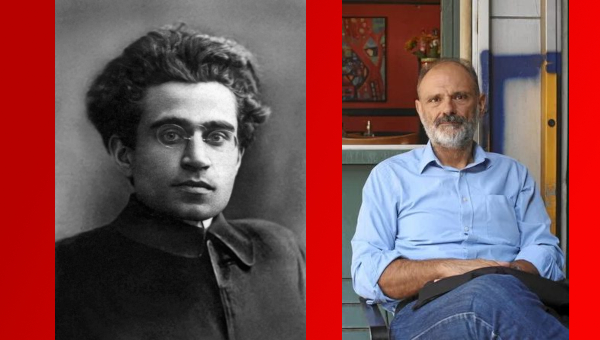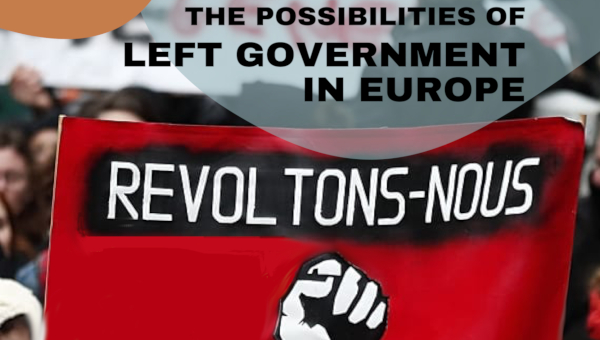My short essay on Lenin is mainly a polemic against the practice – very widespread in the Italian left – of using the justified criticism of ‘state socialism’ and the necessary idea of social self-organization as an alibi in order never to confront the question of state power and control of the means of production. This – always harmful – practice turns into a serious problem when it becomes apparent, as it does today, that state power and private ownership of the means of production are the most important bastions of capital’s rule. ‘Socially diffuse power,’ abundantly investigated by post-Gramscian, Foucaultian and post-workerist theories, is no longer – by itself – in a position to guarantee capitalist hegemony over society. Political power has once again become decisive, not only as the final security to which capitalist rule can have recourse, but as the immediate way of managing social relations.

On this point, it seems to me that Rehmann [see The Bullet No. 865] and Candeias [see The Bullet No. 864] fundamentally agree with me. Thus, on the main issue at hand, we have the same view. And we are similarly in agreement that the (re-) discovery of the importance of state power does not imply the negation of all that the practice of the movements has contributed, in terms of the critique of ‘actually-existing socialism,’ the overcoming of statism, the importance of direct and self-organized democracy and the diversity and complexity of the revolutionary subject.
Differences of Opinion
The differences of opinion have first of all to do with the question of the relation between war of manoeuvre and war of position and secondly with the question of the relation between social and political power, between civil society and the state.
On the first point: Rehmann – rightly – reminds me that Gramsci regards the war of manoeuvre as a dangerous headlong rush, as an extremist and adventurist behaviour based on the illusion that capitalism’s economic crisis can directly metamorphose into a political crisis of the ruling class. My response – however strange it may seem – is that in speaking of the transition from war of position to war of manoeuvre I am not directly concerned with Gramsci’s thinking. In order to deal with this special aspect of Gramscian thinking too many things would have to be analysed – among them the question of the differences between the form of war Gramsci was considering and the actual form of war. This question is very closely connected to the transformation of the mode of production and democracy’s mode of functioning. The problem, however, is simpler and my goal more modest: to stress the fact that in some capitalist countries, above all in southern Europe, which are harder hit by the economic crisis than are other European countries, the difficulty of finding a stable crisis-management solution is being transformed into growing political instability, into a brusque acceleration of the speed in which conflicts are developing, into a constant breakup and new formation of political fronts, which – even if they in fact do not lead to the direct triggering of a revolutionary crisis – make a new organizational form of the anti-capitalist movements necessary: an organization which is in a position to connect the various class fractions and tendencies of the movements as well as to arrive at quick common decisions, and which is in a position to steer the strength of the movements at decisive points of the political conjuncture, points which are constantly changing.
There is thus need of a connective party, which unites the movements without dissolving them within a mass party of the old type, but also of a strategic party, which does not limit itself to the enabling of a dialogue between the various anti-capitalist cultures but is capable of forging a common political line.
All of this does not mean that we can today immediately and continuously pose the question of state power. It means instead that the strengthening or weakening of the anti-capitalist movement and the improvement or deterioration of the relations of forces between the classes are occurring at an uncommonly fast pace and that they are directly influenced by the political decisions that are taken and which today can influence the social dynamic essentially more strongly than was the case in the past. Perhaps the German and French experiences refute my hypothesis, but the Italian ones confirm it.
On the second point Candeias (and also Rehmann) are right to say that it is not possible abstractly to separate the struggle in civil society from the struggle in (or against) the state (also because, I would add, the difference between civil society and state is a conceptual and not an empirical one). Both struggles must be interconnected; however, it is important to understand that they have different timings and conditions. The first requires greater decentralization and a diversity of languages. The second has shorter time cycles, is more concentrated and requires a unity of language. We cannot abolish either the ‘social’ or the ‘political,’ nor can we make one be absorbed by the other. On the contrary, we must understand that this is the basis of an inescapable (and positive) contradiction, which in each instance demands the most appropriate ‘forms of solution.’ Candeias, moreover, is especially right when he emphasises the importance of the new institutions – which I call ‘institutions of the movement’ – and their constitutive character. We cannot speak of the conquest and transformation of state power if we do not start from the existence and construction of such institutions. These represent the locus (a place that must always be distinguished from that of the state), in which the revolutionary subject is first formed, which subsequently occupies and transforms the state. Without this no situation can be defined as ‘revolutionary.’
Clarifications and Self-Organization vs the Party
Two clarifications are needed: formerly, capitalism organized the masses within stabile economic and political structures (in the factories and the apparatuses of the social state); today it is instead tending to disperse the latter through fragmentation of production units and the dissolution of the social state. The new institutions therefore appear not as variants of capitalist organizational forms but as completely new organizational forms which unite a dispersed ‘people’ and whose construction (or destruction) proceeds in much shorter – more ‘social’ than ‘political’ – periods of time than was previously the case. Consequently, the new institutions must be real ‘institutions,’ that is, they must be stable and durable, if they want to challenge current state institutions. Unfortunately, the movements in this political phase are inclined to select very volatile and weak institutions. The task of a political vanguard is therefore to suggest not substituting these ‘weak institutions’ by the party but by ‘strong institutions,’ which are the ‘space’ in which a connective and strategic party can be formed to begin with.
In conclusion, I would like to stress two questions.
We always reason as if there were only two protagonists in the politics of social emancipation: self-organization and the party. Therefore the problem is treated as a new version of the old confrontation between anarchism and Marxism. However, this is a very narrow view of the reality. Alongside social self-organization and the libertarian and anti-statist tendency there is also another one: that of a ‘people’ that consists of isolated individuals divided into their component parts with a tendency not to associate through self-organization but in relation to a political goal or – still worse – in relation to a political leader. It is a ‘people’ that does not have access to the resources to organize itself, which criticises the traditional parties but which nevertheless dreams of an ‘effective’ party, a people which criticises the inefficient state but still wants an influential state that is capable of protecting them from the effects of the crisis. This ‘people’ is perhaps ‘populist,’ but populism is not always and in every instance a right-wing phenomenon. Even in a not insignificant section of people who see themselves as on the left there is populist behaviour, and perhaps ‘left populists’ are much more numerous than the activists who give birth to self-organizations.
An emancipatory project, and above all a socialist project, should busy itself not only with the dialectic between self-organization and party but also with that between party and self-organization, on the one side, and the ‘people,’ on the other. If one neglects this problem, which is often equated with the problem of the alliance between skilled and less skilled labour forces, one abandons the whole people to right populism. Consequently, the party cannot be just a connective and strategic one. It probably would also have to take over some essential features of the old mass party or, with all due caution, incorporate some aspects of a politics based on personal charisma.
Finally, in “Occupy Lenin,” I clarify that state power is not identical with public national institutions but with a complex of public and private, national and supranational institutions. This is especially the case in Europe, where national sovereignty – especially that of the weakest countries – tends to be absorbed by supranational technical organs. In this case, the conquest of state power also necessarily implies a supranational strategy. However, this does not automatically mean that this strategy has to be a European one. If an authentic anti-capitalist European movement is not able to emerge in time, then the conquest of state power would have to be identified with the definition of a new political space, which first and foremost restores the national dimension and immediately afterwards constructs a supranational dimension of a new type. This is what could happen in the case of a rebellion of southern European workers and the creation of a federation (and currency) of the PIIGS. Seen in this light, the conquest of state power implies not only action within a given situation but also the creation of a completely new situation and not the conquest of an existing power but the creation of a still not existing power. •






